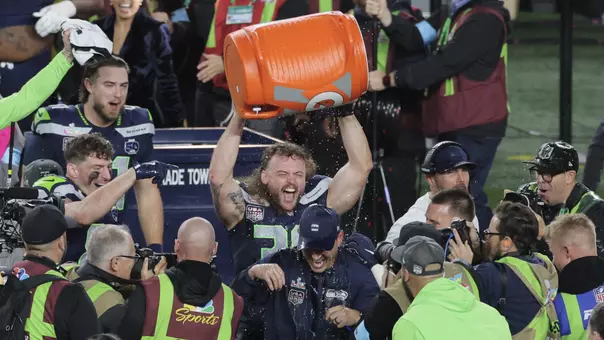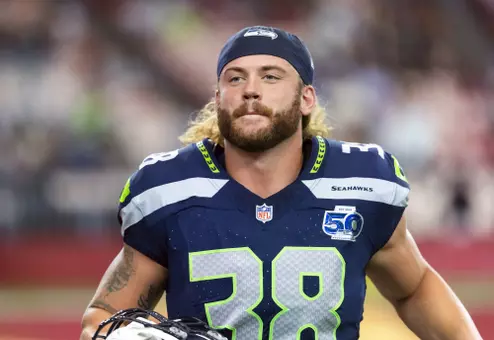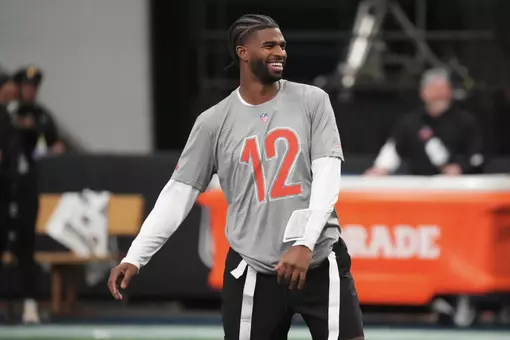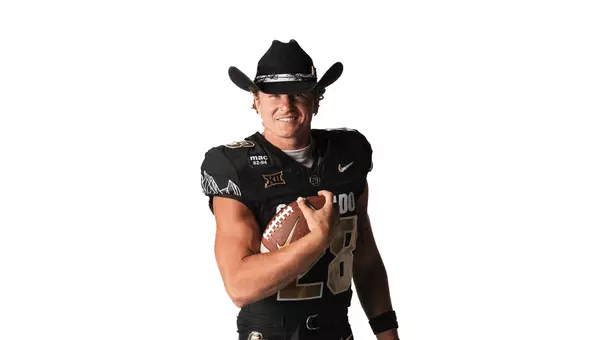Colorado University Athletics
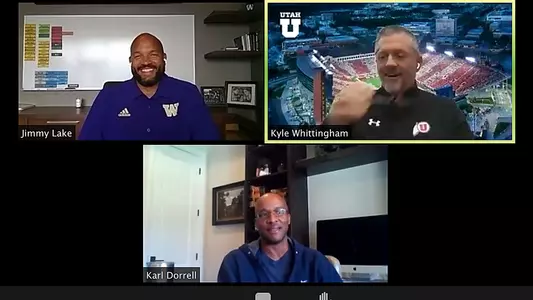
CU's Dorrell, Other Pac-12 Coaches Discuss Possible Player Return Timetables
May 12, 2020 | Football, Neill Woelk
BOULDER — As the college sports world begins the process of inching toward a possible reopening, football coaches are discussing the minimum time needed for a team to prepare for a season.
Tuesday morning, three Pac-12 coaches — including Colorado's Karl Dorrell — said teams will need at least six weeks to get ready to play a football season. CU's new head coach said he would prefer at least eight weeks, but added that six seems to be the consensus among coaches as far as the minimum amount of time necessary to prepare.
Dorrell, Utah's Kyle Whittingham and Washington's Jimmy Lake all participated in a Pac-12 "webinar" with the media Tuesday, part of a four-day series with every Pac-12 head football coach. Questions for the coaches covered a variety of topics, but nearly all had a common theme — the Covid-19 pandemic that basically shut down much of the nation, including virtually every facet of the sports world.
Dorrell said an ideal situation would be at least eight weeks to prepare for a season.
"I'd like to have a month of training and conditioning to kind of get them in shape, then a month of training camp and play the game," he said. "But I don't think we're going to get anything close to that. I know it's going to be a little bit of a faster process."
Indeed, later in the interview, all three coaches said six weeks appeared to be the consensus.
"I think six weeks is what you need, regardless of whatever schedule you have," Dorrell said. "Whether it's a 10-game schedule or a 12-game schedule, I think you still need that prep time. I would say what Jimmy (Lake) said — that's the minimum from my standpoint. Six weeks is a good amount of time but we wouldn't want to be anything less than that."
As it stands now, Colorado is scheduled to open the season Sept. 5 at Colorado State. If the season did indeed open on time and the Buffs received exactly six weeks to prepare for that opener, it would mean a July 25 reporting date for two weeks of strength and conditioning, followed by four weeks of practice.
If the six-week rule did not include game-week preparation, it would mean a July 18 reporting date.
"Given the circumstances in this season and what we're dealing with, I think all of us coaches feel whatever time they give us, we'll be appreciative of it and we'll just make the most of it," Dorrell said. "That's really how my mindset is. But if I had my druthers, I'd say I want an eight-week process before that first game."
Dorrell is one of three head coaches in the Pac-12 new to his program this season, along with Washington's Lake and Washington State's Nick Rolovich. None of the three had the luxury of even one spring practice this year.
But while Lake is UW's new head coach, he takes over a program in which he served as an assistant for the last six years. He was handed the reins on Dec. 2 when Chris Petersen resigned, allowing for plenty of transition time in a program with which he is obviously quite familiar.
Rolovich, meanwhile, took over at WSU on Jan. 13, giving him time to at least oversee some of his first recruiting class there and also familiarize himself with personnel.
Dorrell had no such luxury in either area. Named to the position at CU on Feb. 23 after the unexpected departure of Mel Tucker, Dorrell not only had nothing to do with the 2020 recruiting class, he also barely had time to introduce himself to CU's players before the shutdown began.
Overall, eight Pac-12 schools — Arizona State, Stanford, Utah, Arizona, Oregon State, UCLA, Cal and Oregon — got in at least one week of spring ball, with ASU and Stanford completing two weeks worth. USC got one spring practice in before the shutdown while CU, UW and WSU did not have the chance for a single practice.
But Dorrell also refuses to let the timing of his hiring become any sort of excuse. He and his staff have been holding regular Zoom meetings with players — the NCAA now allows eight hours per week for such meetings — and he said the Buffaloes are moving forward as best they can.
"We're doing our eight-hour rules with our virtual meetings and installs," Dorrell said. "The strength and conditioning people are doing what they can. We're being patient in the process right now. We don't even talk about spring practices. It never really occurred, so you have to let that go and try to look forward to what's in front of us now."
Obviously, no timetable has yet been established for the possible reopening of any athletically related activities on college campuses. But as the calendar continues to flip closer to September, coaches and administrators continue to study the possible scenarios that might unfold. Whittingham even hinted that the possibility of players returning for small-group workouts could happen in the relative near future.
"We don't have any definitive answers but there is some talk about maybe June 1 introducting small groups back into the weight room," Whittingham said. "We'll see if that comes to fruition. But right now there's nothing concrete. We're just playing it by ear each day and getting the updates each day. If we are able to get back into the weight room June 1, even on a limited basis, that would be great. But that remains to be seen."
But even if players are allowed back for small-group workouts in the relative near future, that is a long way from actual games. The multitude of scenarios that still exist in that regard range from starting on time with a full 12 games — something Whittingham said he believes "the odds are probably against" — to eight- or nine-game schedules that start later in the fall and include only conference games. There are also still scenarios being floated by some that include a "split season," some games in the fall/winter, followed by a completion of the schedule in the spring.
And, the question of whether fans will be allowed in the stands is still to be answered as well.
Dorrell said he doesn't want to cut games from the schedule if at all possible, and could see a scenario in which the preparation time is cut down even below six weeks.
"We're all anticipating having a full season," he said. "We're hoping the six-week process backs up from when your first game day is. Then away you go from there. I'm not interested in losing games because I'm down to a month of preparation. I think as a coaching group, we still want to play as many games as we can. I think we would do it with whatever time frame they give us to do it. We're just merely making suggestions as to what is the proper amount of time for the preparation. We don't want to lose any games, for sure."
Whittingham said speculation on the season doesn't serve a purpose at this point.
"Right now, all options are on the table," Whittingham said. "We've got all kinds of things we've talked about as a conference. I think there's a lot of questions that have to be answered … We'll see what happens, but there's so much unknown and so much fluidness to the situation that it's really pointless to try and pinpoint any one direction that we're going to go. We're just going to have to wait and see and go from there."
There are also issues that conferences and the NCAA will no doubt have to address when it comes to how certain states deal with "reopening" due to the pandemic. Some may open sooner than others, which means schools in those states that open sooner could technically allow student-athletes back for at least small-group workouts ahead of other schools in the same conference.
Dorrell said he would like to see an NCAA ruling that would mandate when practices could begin that would apply to every school.
"I think there should be a blanket start as to when that six-week process, or whatever time frame it is, to prepare for your season," Dorrell said. "I think the NCAA should govern that."
But Dorrell also said he would be in favor of smaller workouts being available to schools in states that would allow such gatherings, even if other schools in other states didn't have the same allowance.
"I made this proposition to the group last week," Dorrell said. "Let's say if Colorado did open up and we're able to work out. That's still a governing time of just training, stuff we're getting (NCAA) supervision for. I would be in favor of that and I think from a conference perspective, if there's schools that couldn't do that, where they couldn't come back on campus, I would try to get it legislated to where those campuses can have virtual supervision for workouts. I just think whenever we can open up and train, that's more important. I would try to take advantage of any and all time given what the NCAA governs us to do."
But until there is any movement forward on any of the issues, Dorrell and his staff will continue to work under the current circumstances.
"We haven't really had a chance to have a lot of staff time to iron out the organizational procedures and how that works," Dorrell said. "We've talked about it but it's different when you're talking about it and doing things from a remote sense and not really being collectively in one room and working things out and giving descriptions and examples when we're all together. The newness of a staff is going to take some tweaking and getting used to, and these circumstances have slowed a little bit of that process. But other than that I've been very pleased with what they've been able to do. I've been in their Zoom meetings with their players. I've got really good teachers, and that's really first and foremost — I want good teachers. I think we're getting our information conveyed to our student athletes."
Contact: Neill.Woelk@Colorado.edu


